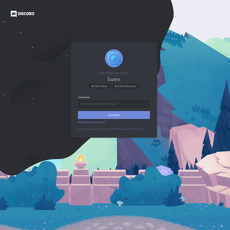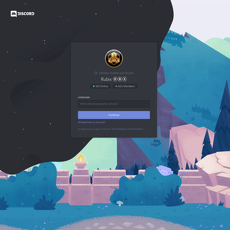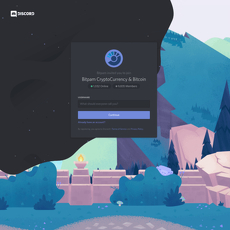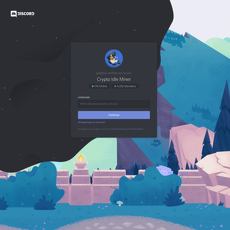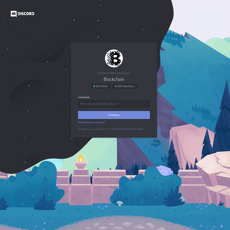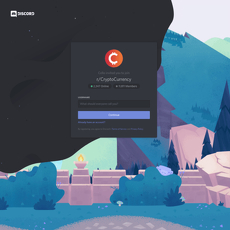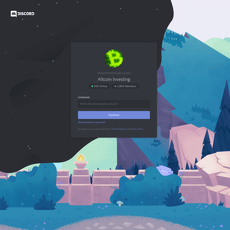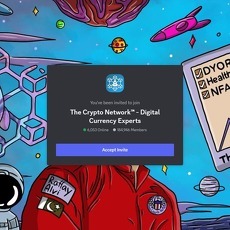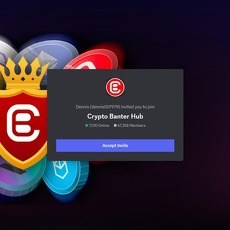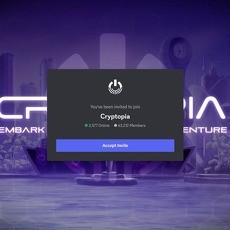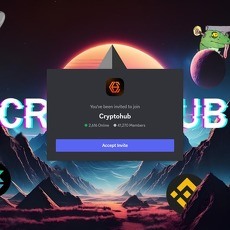r/CryptoCurrency Review
r/CryptoCurrency
discordapp.com
r/CryptoCurrency + Official Discord Review Guide: How to Join, Earn Moons, and Stay Safe (FAQ Inside)
Ever scroll through crypto chats and think, “Is any of this actually useful?” If you’ve wondered whether r/CryptoCurrency and the official Discord are worth your time, you’re in the right place.
The real problem: noise, shills, and the same questions on repeat
Most crypto spaces feel like a nightclub at 3 a.m.—loud, crowded, and everyone’s yelling their favorite coin. You want signal, not spam. You want to ask a question without getting farmed for DMs. You want the truth about Moons, not a mess of half-answers.
Typical day in public crypto chats: “What’s the next 100x?” “Is this airdrop real?” “Why did my post get removed?” “How do I earn Moons?” Repeat. Repeat. Repeat.
Here’s what most people quietly struggle with:
- FOMO loops: Hype lures you into bad trades or paying attention to the wrong stuff.
- Shill storms: Low-effort promotions drown real discussion. If someone’s “guaranteeing” returns, it’s a trap.
- Safety fatigue: Fake support accounts, airdrop phishing, and sketchy links are everywhere. Chainalysis has shown for years that scams remain a leading category of crypto crime—no platform is immune.
- Content whiplash: Solid info gets buried under memes and price spam before you even see it.
- Moons confusion: People want to earn Moons but don’t know what counts as quality or why they got zeroed out.
There’s a reason it feels chaotic. Research out of MIT (Vosoughi, Roy, Aral, Science) showed false or sensational content tends to spread faster on social platforms than sober updates. In crypto, that effect compounds because markets move quickly and emotions run hot. Big crowds create a lot of noise—but also real opportunities if you know where to look and how to filter.
What I’ll help you do (and what you can expect)
I’ve spent a lot of time inside r/CryptoCurrency and the official Discord, stress-testing what actually works. My goal is to help you turn these communities into useful tools—not time sinks.
- Get value fast: I’ll show you how to approach the subreddit and Discord so you find high-signal threads and discussions quickly.
- Understand Moons: What they are, how they’re earned, and why some accounts get nothing even after posting “a lot.”
- Stay safe: Simple habits to avoid fake links, scammy DMs, and bogus “support” reps pretending to help.
- Ask better questions: Small tweaks that get you real answers instead of shill replies.
Think of this as your practical map: where to start, what to skip, and how to contribute without getting muted, removed, or banned. I’ll keep it straight, actionable, and focused on what pays off.
Why r/CryptoCurrency and the official Discord are worth a look
When you’re after broad market sentiment and community-tested insights, scale matters. r/CryptoCurrency has millions of members and a long history of active moderation. The official Discord brings live chats, quick feedback loops, and structured spaces that complement the subreddit. Used right, the two together give you:
- Faster context: You see what retail traders, builders, and watchers are thinking right now.
- Quality incentives: Moons nudge people toward helpful posts (not perfect, but better than the usual free-for-all).
- Community memory: Recurring threads and saved resources help you avoid beginner traps others already documented.
Of course, none of this replaces your own judgment. But if you want a living pulse on crypto chatter—without drowning in it—these two hubs are among the best places to start.
Who this guide is for
- Beginners: You want a safe, sane on-ramp and a way to learn Moons without getting farmed by scammers.
- Active traders: You want higher signal, good sentiment reads, and fast access to useful discussions—without wasting an hour to get one nugget.
- Lurkers and researchers: You want clean news, smart comments, and a place to test ideas without swimming through meme bait.
- Builders and analysts: You want feedback loops, user perspectives, and a quick way to check the temperature on narratives.
What you won’t get here
- No “secret” pumps, no signal-selling, no DM bait.
- No hype for the sake of hype. If something’s risky or weak, I’ll say so plainly.
- No recycled advice you’ve seen a thousand times. This is about what works inside these spaces.
Ready to make your first day count? Up next, I’ll show you exactly what r/CryptoCurrency looks like at a glance—daily threads, rules, karma culture, how posts actually reach the front page, plus a quick tour of the official Discord and the channels you’ll use most. Want a simple way to avoid getting lost on day one?
What r/CryptoCurrency is, how the Discord fits in, and what you can expect day one
r/CryptoCurrency is Reddit’s biggest town square for crypto talk—news, arguments, guides, memes, research, and a running tally of what the crowd is actually paying attention to. The official Discord is the real‑time sidekick: faster chats, voice events, AMAs, and live market talk when things get spicy.
Day one, expect this:
- Fast signal with healthy noise: big headlines bubble up quickly; so do hot takes. Your edge is filtering well.
- Clear rules: price talk belongs in megathreads, sources matter, shills get iced fast.
- Helpful regulars: people will point you to pinned guides, scam warnings, and the right channel to ask in.
“In crypto, the feed never sleeps. Your job isn’t to read everything—it’s to read the right things.”
Bonus: research has found that spikes in Reddit discussion often line up with short‑term crypto volatility. That doesn’t mean “buy the chat,” but it explains why these rooms are useful for situational awareness. (Example: sentiment studies on social media and crypto volatility, 2018–2021; and Reddit’s own explanation of how content rises in Hot/Rising.)
Subreddit at a glance: daily threads, rules, karma culture, mod tools, and how posts reach the front page
Open r/CryptoCurrency and you’ll see a predictable rhythm that keeps things readable:
- Daily Discussion: the main plaza for price talk and quick questions. If you want to ask “What’s going on with BTC today?”—this is where it goes.
- Weekly skeptics/education threads: space for thoughtful debunking, learning, and “explain like I’m new” posts.
- Monthly Moons posts: distribution updates, policy changes, and proposals.
- Governance proposals (CCIP): community votes that actually change sub rules or how community points are handled.
- Scam alerts: flagged links, fake support accounts, and ongoing fraud patterns.
The rules are strict, and that’s a good thing:
- No referral links or “DM me to invest” garbage
- Price talk stays in megathreads so main feed stays clean
- Source your claims (filings, docs, audits, code, reputable coverage)
- Use post flairs (News, Discussion, Guide, Scam, Research, etc.) so readers know what to expect
Karma culture is simple: quality comments and useful links get upvotes. Low‑effort hype gets buried. New accounts and low‑karma users face tighter filters—AutoModerator will sometimes hold posts for review. Don’t take it personally; it’s how the sub keeps the bar high.
How posts reach the front page:
- Timing + early engagement: a strong headline, credible source, and an informative first paragraph help.
- Flair and format: “[News] SEC approves XYZ filing (link) — 3 key takeaways” beats “Moon soon?”
- Discussion quality: comments with context, charts, and links push the thread up in “Hot” and “Rising.”
Example that tends to work: [News] Spot ETH ETF S-1 updated — what changed and why it matters (3 bullets, source links to SEC, reputable coverage). Clear, sourced, and useful in 10 seconds.
Official Discord tour: channels you’ll actually use, roles, verification, and live events like AMAs or market talk
The Discord is where the heartbeat is live. Here’s a quick tour so you don’t get overwhelmed:
- #start-here / #rules: read, react, and unlock the server. A quick captcha or phone‑based check protects everyone.
- #announcements: server updates, event schedules, and AMA dates. Set this to “Only @mentions.”
- #market-talk: the busiest room during big moves. Slowmode kicks in when things get chaotic.
- #news-feed: curated headlines from reputable sources; great for scanning.
- #alts, #defi, #nft: niche chat without clogging #market-talk.
- #research / forum channels: longer posts, charts, on‑chain dashboards, and discussion threads that don’t get lost in the scroll.
- #moons / #governance: community points, proposal debate, and voting reminders.
- #scam-watch / #support: report fake links, ask route‑finding questions, and get pointers to verified docs.
- Stage/voice rooms: for AMAs, CPI/Fed watch parties, halving nights, and “state of the market” chats.
Roles are practical, not flashy:
- Verified: passes anti‑bot checks and unlocks core channels
- Interest roles: tap to open specific sections (trader, researcher, builder, NFT, DeFi)
- Event pings: opt‑in so you only get notified for AMAs or major news
Live events worth catching:
- AMAs with builders/analysts: mods screen questions; good answers get summarized for later reading.
- Macro/market sessions: during CPI/FOMC/ETF news, thousands show up. Expect fast chats, charts, and instant link sharing.
- Security clinics: how to spot fake support, wallet hygiene, and real‑world scam breakdowns.
Tip for sanity: right‑click noisy channels and set “Mute for 8 hours” or “Suppress @everyone.” Keep #announcements and your interest channels on.
Who hangs out there: retail traders, devs, analysts, and complete newbies—how each group uses the spaces differently
- Retail traders
Where they live: Daily Discussion on Reddit, #market-talk on Discord.
What works: tight headlines, legit sources, and charts that actually say something. Share TradingView links and add a short TL;DR (levels, invalidation, catalyst).
What flops: “Wen moon?” posts in the main feed. Keep price talk to the daily thread. - Developers and builders
Where they live: AMAs, #builders/#research threads, governance discussions.
What works: repos, docs, architecture diagrams, and “what we shipped this week.” If you want feedback, ask a specific question and link code.
Pro move: time your post near an AMA or release note for better engagement. - Analysts and data folks
Where they live: Research forum threads, longform Reddit posts with flairs like [Research]/[Guide].
What works: method + chart + source. Dune dashboards, on‑chain metrics, SEC/CFPB filings, exchange transparency reports. Start with a 5‑bullet TL;DR; add citations at the bottom. - Newcomers
Where they live: Daily Discussion, weekly Q&A, #support/#learning-resources.
What works: simple questions in the right thread: wallet setup basics, fee explanations, how to read a contract page. People are kind when you post in the right place.
Golden rule: never share seed phrases or QR codes; nobody legit will DM you first.
Noise is a feature, not a bug—filter better than the crowd, and you’ll see what matters before most do.
So you know the lay of the land. Want a clean plan to join, verify, and start talking without getting flagged by automod—or worse, banned on day one? Keep reading; I’ll show you exactly how I do it step by step next.
Getting started: join, verify, and engage without getting flagged
How to join the subreddit and Discord the right way: quick steps, account hygiene, and must-read rules
I love fast starts—but crypto communities are guarded for good reasons. The fastest way in is the cleanest way in. Here’s how I join and avoid tripping any wires on day one.
- Reddit (r/CryptoCurrency)
- Create/refresh your account hygiene: verify your email, turn on 2FA, add a profile pic/header, and make a few normal comments on non-crypto subreddits first. New, link-heavy accounts trigger AutoMod more often—Reddit’s own transparency reports make it clear spam is a constant fight.
- Read the rules once, then again: start with the official rules page here and the wiki here. Most issues come from skipping these.
- Warm up in daily threads: add thoughtful comments in the Daily Discussion or Questions megathreads before posting standalone content. It builds karma and trust, fast.
- Post format that won’t get flagged: write a short summary (2–4 lines), add 1–2 reputable links, pick the correct flair (News, Discussion, Guide), and avoid referral links or price-only talk.
- Time your move: post during active hours (US/EU mornings) and stick around to reply to comments. Drive-by posts feel spammy.
- Discord (Official server)
- Join the correct link: https://discord.gg/cryptocurrencyofficial. Anything else is suspect.
- Verify calmly: complete the server’s verification (captcha/phone if required), read the #rules channel, and accept the server guidelines to unlock channels.
- Grab roles the server provides: roles often gate channels (news, market chat, AMAs). Read channel descriptions before posting—each has its purpose.
- Tune your security: in Discord Settings → Privacy & Safety, enable Safe Direct Messaging and disable “Allow direct messages from server members.” Official guidance here: Discord Privacy Settings.
“In crypto communities, trust isn’t asked for—it’s earned. Start small, show your work, and the doors open.”
Best practices for posting and chatting: what gets upvoted, what gets muted, and how to avoid instant bans
I’ve watched thousands of threads and chats win or lose the room. Patterns are clear:
- What gets upvoted
- Actionable summaries: “Here’s what happened, why it matters, and what to watch next.” Keep it tight and useful.
- Receipts: link to primary sources (official blogs, audits, GitHub, explorers). The community values proof over opinions.
- Original angles: on-chain snippets, charts you built, or lessons learned from mistakes. Practical beats poetic.
- Respectful debate: disagree with ideas, not people. You’ll get more thoughtful engagement.
- What gets muted (or removed)
- Price-only posts (“Will X hit $10?”), low-effort memes, one-line link drops, political baiting, or off-topic rants.
- Unverified rumor chains with zero sources. If you can’t cite it, don’t post it.
- What triggers instant bans
- Referrals/affiliate links, pump rooms, paid shill offers, fake “support” DMs, or impersonating mods/devs.
- Coordinated brigading or vote manipulation.
Here are simple templates I use to keep things clean:
- Post title: “L2 bridge paused after security alert—what it means for deposits/withdrawals [official post + explorer link]”
- Opening summary: “Team paused the bridge due to abnormal activity. No confirmed exploit yet. If you used it in the last 24h, consider revoking approvals (steps below). Sources and mitigations included.”
- Discord question: “Anyone tracking the tx starting with 0xabc… on Nova? I’m seeing approvals to a new contract. Here’s the urlscan and explorer link—sanity check welcome.”
If you want data on why this works: platforms publicly emphasize source-backed content and safety. Reddit’s and Discord’s latest transparency/safety reports show heavy enforcement against spam and deceptive links—accounts that behave like people, not funnels, get better reach. See Reddit’s Transparency Report and Discord’s Transparency Portal.
Privacy and safety settings: DMs, link checks, and simple habits that keep you safer in public crypto chats
Crypto chats are target-rich environments for scammers. I run this “always-on” setup:
- Lock down DMs
- Discord: Settings → Privacy & Safety → Keep me safe ON and Allow DMs from server members OFF.
- Reddit: Settings → Safety & Privacy → limit who can message you and who can see your activity.
- Never share sensitive info
- No seed phrases, no private keys, no QR codes, no screen shares showing wallets.
- Never “verify” anything via DM—real teams don’t cold-DM for fixes or airdrops.
- Check every link
- Use urlscan.io or VirusTotal before clicking.
- Confirm domains (no weird subdomains or typos) and cross-check with official socials/sites.
- For contracts or transactions, use trusted explorers (e.g., Etherscan; for Arbitrum Nova, nova.arbiscan.io).
- Use burner setups for risky stuff
- Separate browser profile for crypto; uBlock Origin and HTTPS-only modes help.
- Use a burner wallet for testing dapps or airdrops; hardware wallet for anything real.
- Regularly revoke token approvals: revoke.cash or similar.
- Trust the room, not the DM
- Ask questions in public channels or threads. If someone insists on moving to DMs “for urgent help,” assume it’s a scam.
- Report and block fast. You’re not being rude—you’re being safe.
“If it’s urgent and private, it’s probably a scam.”
Two-minute pre-post checklist
- Did I read the rules and pick the correct flair/channel?
- Is my title honest, specific, and free of clickbait?
- Do I provide at least one primary source?
- Have I removed any referrals/affiliates?
- Am I ready to stick around and reply constructively?
Get this right and you’ll not only stay clear of flags—you’ll build a reputation that actually leads to better discussions and, yes, real community rewards. Speaking of rewards, want to see how contributions turn into Moons and what you can actually do with them?
Moons explained: what they are, how to earn them, and what you can do with them
What is r/CryptoCurrency Moons (MOON)? Plain-English overview, where they live, and why they exist
Moons (MOON) are the r/CryptoCurrency community’s on-chain token. They started as Reddit’s Community Points experiment and now live as an ERC-20 on Arbitrum Nova (a low-fee Layer 2 built on Ethereum). You’ll usually see your balance in your Reddit Vault (the built-in crypto wallet in the Reddit app), but you can also move MOON to a normal self-custody wallet that supports Nova.
Why do Moons exist? To reward useful contributions and align incentives. Instead of karma disappearing into the void, Moons turn high-signal posts and comments into something you actually own and can use.
“Show me the incentive and I will show you the outcome.” — Charlie Munger
That’s the whole thesis. When good research, smart questions, and scam-warnings are rewarded, the feed gets sharper. If you’ve read any work on online communities (I like Kraut & Resnick, MIT Press), you know consistent, fair incentives raise quality and retention. Moons are that incentive layer for r/CryptoCurrency.
- Network: Arbitrum Nova (Ethereum L2). Low fees, fast finality.
- Wallets: Reddit Vault, or any EVM wallet configured for Nova (e.g., MetaMask).
- Ownership: On-chain tokens you control; you can send, hold, or use them in community tools.
How to earn Moons: quality contributions, community points, and common pitfalls
Moons are distributed to contributors based on subreddit-specific karma earned during a given period and other community factors defined in the monthly distribution rules. In simple terms: create value in r/CryptoCurrency, earn karma there, and you’ll be eligible when the distribution opens.
What typically earns Moons (based on years of community patterns):
- Original research that cites sources: tokenomics breakdowns, on-chain sleuthing, regulatory summaries with links.
- Beginner-friendly explainers: clear, visual, and non-condescending guides to wallets, fees, or staking risks.
- Actionable safety posts: phishing alerts, fake-support warnings, address-poisoning examples, and how to avoid them.
- Market structure and data: liquidity heatmaps, funding-rate context, open-interest shifts, with charts and explanations.
- High-signal comments that add context, correct misinformation, or bring receipts—especially in hot threads.
How it usually works in practice:
- You post or comment on r/CryptoCurrency (not elsewhere). Quality gets upvoted, low-effort gets ignored or removed.
- Each month, there’s a distribution window. If you’ve earned eligible karma and follow the rules, you can claim to your Vault.
- Claims are time-limited. Miss the window, and you miss that round—so keep an eye on the pinned distribution post.
Pitfalls that get you zeroed out (or worse):
- Spam and low-effort posts: price-only chatter, referral links, and AI-written fluff typically get removed.
- Plagiarism or reposting others’ work without credit. Instant way to lose trust—and eligibility.
- Vote manipulation/brigading: coordinating upvotes or using alts. Mods take this seriously.
- Breaking subreddit rules: ban = no Moons. Read the rules, especially on self-promo and sensational claims.
- Posting outside r/CryptoCurrency: karma from other subs doesn’t count toward Moons.
Quick tip: Before posting, ask yourself—if a newcomer read this, would they leave smarter and safer? If yes, you’re on the right path.
What is R cryptocurrency used for?
When people ask “What is R cryptocurrency used for?” they’re usually referring to r/CryptoCurrency’s Moons. Here’s what you can actually do with MOON today:
- Tipping: Say thanks for a helpful post or comment. Depending on current tooling, you can tip directly via a community tip bot or by sending to a user’s wallet. Always follow the latest pinned instructions.
- Governance: Some community decisions use Snapshot (gasless voting). Connect the wallet that holds your MOON and vote on proposals that shape how Moons and community initiatives work.
- Rewards and bounties: Contests, research bounties, design challenges, or translations often pay in MOON. Watch official threads so you don’t miss legit opportunities.
- Goods/services inside the ecosystem: You’ll occasionally see flair upgrades, banner placements, design gigs, or research tasks quoted in MOON in mod-approved threads.
How to hold, tip, vote, and spend responsibly:
- Holding: Keeping MOON in your Reddit Vault is fine. If you want full wallet control, export your seed (securely, offline) and/or import to a self-custody wallet that supports Arbitrum Nova.
- Moving to a wallet: Add Arbitrum Nova to your wallet, add the verified MOON token contract from an official, mod-pinned source, then test with a tiny amount first.
- Tipping: Confirm the recipient’s address or approved tip-bot handle. No screenshots, no “trust me bro.” On-chain or via the official tip flow only.
- Voting: Head to the community’s Snapshot page when proposals go live, connect the wallet that holds your MOON, and vote. Snapshot is gasless, but you’ll still want a small amount of ETH on Nova for regular transfers.
- Spending: If you trade MOON on DEXs, triple-check you’re on Arbitrum Nova, not a fake chain or copycat token. Consider using the official Arbitrum bridge (bridge.arbitrum.io) and stick to reputable interfaces.
Security basics you’ll thank yourself for later:
- Back up your Vault recovery phrase offline. Never share it. Ever.
- Bookmark official links. Phishing pages love to clone “claim” and “airdrop” screens.
- Turn off unsolicited DMs. Real mods won’t ask for your keys.
- Start with tiny test transactions. If those settle as expected, proceed.
Fast-start checklist:
- Create/secure your Reddit Vault in the Reddit app.
- Read the monthly Moons distribution post and the sub’s rules.
- Plan one helpful post per week (original research, explainers, safety alerts).
- Engage in comments with sources, not slogans.
- Claim Moons when the window opens, then consider moving some to a self-custody wallet on Nova.
One last thought: Moons are a community signal, not a get-rich-quick button. Treat them like proof you showed up, helped someone, and made the space better. The rest tends to follow.
If someone offers you “guaranteed returns” for sending MOON or asks you to “verify” your wallet in DMs, would you spot the trap in under 30 seconds? Keep reading—I’ll show you a fast, repeatable scam-check that saves time and money every week.
Staying smart: spotting scams and checking if a crypto project is legit
“If it sounds too good to be true, it usually is.” That line has saved more crypto wallets than any hardware device. FBI and industry reports keep repeating the same thing: investment scams drain billions each year, and most of them could have been avoided with simple checks. Here’s the fast, practical system I use before I give a project my attention—let alone my money.
Quick due diligence flow: website, team, docs, code, tokenomics, audits, and realistic roadmaps
I run a 10–15 minute pass first. If a project fails here, it doesn’t earn a deeper look.
- Website sanity check
- Action: Check domain age (use WHOIS) and the site’s history (use Wayback Machine).
- Good signs: Clear product, no vague buzzwords, consistent brand across site and socials.
- Red flags: New domain pretending to be “established,” dead links, fake press logos, aggressive popups pushing “limited-time” sales. - Team and accountability
- Action: Click through LinkedIn/Twitter profiles. Do they have a history in tech/finance? Are they referenced by credible folks?
- Good signs: Team mentions in conference talks, GitHub contributions under their names, normal work history.
- Red flags: Stock photos for “team,” private or freshly created socials, unverifiable “advisors,” celebrity drops with no proof. If they claim a partnership, confirm it on the partner’s official blog or X account. - Docs and whitepaper
- Action: Read the first two pages; you’ll know if they’ve built anything real.
- Good signs: Clear problem/solution, architecture, economics, risks, and how they’ll measure success.
- Red flags: Pages of fluff, no specifics, “top-tier exchange listings” promised (nobody can promise that), or no mention of risks. - Code and repos
- Action: Open the GitHub/GitLab. Check commits, contributors, and whether the repo matches claims.
- Good signs: Multiple contributors, recent commits, issues being closed, tags/releases.
- Red flags: Empty or forked repos passed off as original work, all commits in one weekend, private repos only. If it’s a smart contract token, view the verified contract on Etherscan/BscScan. - Tokenomics
- Action: On Etherscan/BscScan, open the token and click “Holders” + “Contract.”
- Good signs: Transparent allocation, vesting schedule, reasonable treasury, and unlocks published (check TokenUnlocks or project docs).
- Red flags: Top 1–3 wallets control the majority, “mint” or “blacklist” functions without strong governance, hidden or huge upcoming unlocks, or no vesting for team/investors. - Liquidity and trading
- Action: For DEX tokens, check the pair on DexTools or the explorer. Is liquidity locked, for how long, and where?
- Good signs: Significant LP relative to market cap, LP locked on a known locker (and verifiable on-chain).
- Red flags: Tiny liquidity, team holds the LP tokens, “locked” LP that actually unlocks in days, or trading limited to obscure DEXes with no volume. - Audits and security
- Action: If there’s an audit, verify it exists on the auditor’s website, not just a PDF on the project site.
- Good signs: Multiple reputable auditors, on-chain bug bounty, transparent disclosures.
- Red flags: Unknown “audit firms,” fake badges, or audits ignoring key risks like admin keys or upgradeable proxies. Remember: audits reduce risk; they don’t remove it. - Roadmap vs. reality
- Action: Compare roadmap promises with shipped features and public commits.
- Good signs: Iterative releases, realistic milestones tied to metrics (users, TVL, integrations).
- Red flags: “Tier-1 CEX listing Q1,” “Partnership with Google/Apple” with no source, metaverse + AI + everything buzzword soup.
Small real-world example: A project once bragged about a Chainlink deal. A quick search of “site:chain.link [project-name]” showed no mention. That two-minute check saved me hours of research—and potentially a wallet drain.
Street-smart checks: search the project name with “review,” “scam,” or “complaint,” look for community warnings, and watch for red flags (guaranteed returns, pressure to send funds, fake support)
- Search signals
- Try: [project name] review, [project name] scam, [project name] complaint, and site:reddit.com [project name].
- Look for consistent themes: withdrawal issues, devs ghosting, or users pressured to move chats to DMs/WhatsApp. - Too-good-to-be-true hooks
- Guaranteed APY or “risk-free” yield.
- Celebrity “giveaways” asking you to send crypto to get more back.
- “Support” accounts that DM you first, ask to screen-share, or want seed phrases. No legit support needs your keys—ever. - Social proof vs. real usage
- Telegram with 100k members but muted chat and 5 people online?
- Twitter with 200k followers but 20 likes per post?
- Healthy projects show consistent engagement, not botted metrics. - On-chain ownership traps
- Check if the contract is upgradeable or if the owner can pause trading or change fees at will.
- Look for multi-sig addresses (e.g., Gnosis Safe) holding admin rights instead of a single EOA wallet.
- Use revoke.cash to clean risky approvals you granted elsewhere. - “Pig butchering” and romance-investment blends
- Scammers build trust for weeks, then push a “private platform” or “whitelist.” The “exchange” often lets you deposit but blocks withdrawals unless you pay fake “taxes.” If anyone rushes you, that’s your exit cue. - Fake web properties
- Beware Google Ads or typo domains that clone real sites. Always type URLs yourself or use saved bookmarks. Confirm support links from official docs or pinned posts only.
Law enforcement and analytics firms repeat the same takeaway every year: scams thrive on urgency, isolation, and secrecy. Break that triangle by slowing down, asking in public, and verifying on-chain.
How to ask better questions in r/CryptoCurrency and Discord to get useful answers (and avoid shills)
Good questions get good answers. Here’s the template I use when I want signal, not spin:
- Give context in one paragraph
- What the project claims to do, where it runs (chain), and how you found it. - Link pack (so people can verify)
- Website, docs/whitepaper, GitHub, token contract (Etherscan/BscScan), audit link (from the auditor), DexTools/CoinGecko page, and any “partnership” announcements from the partner’s official site. - Show your homework
- Mention 2–3 things you already checked (e.g., top holders, LP lock, team profiles). This filters out shills and invites experts to go deeper. - Ask focused, falsifiable questions
- “Are there any admin functions that can block transfers?”
- “Is the audit on the auditor’s website? Did they address the proxy and mint functions?”
- “Do unlocks align with product milestones or will sell pressure hit before traction?” - Set the tone
- Say upfront: “I’m not investing, just researching.” It discourages DMs and shill pitches. Keep conversations in public channels and sub-threads.
Example post that gets quality replies:
I’m researching [Project X] on Arbitrum. They claim real-yield from protocol fees. Holders tab shows top 10 wallets = 62% (team + investors). LP is locked for 12 months on Team.Finance (link below). Audit says “low risk” but I don’t see it on the auditor’s site—only a PDF. Can anyone confirm if the contract is upgradeable and whether the mint function is restricted by multi-sig? Links: Etherscan, GitHub, audit page, partner announcement (from partner’s site).
That kind of post attracts analysts and devs who can answer precisely. And if someone responds with “DM me for secret alpha,” you’ve just found your red flag.
Want quick, trustworthy answers to the questions everyone asks—like how to spot legit projects fast, what Moons are really used for, and where to check live prices without getting trapped by fake sites? Keep going to the next section.
FAQ: fast answers to the questions everyone asks
What is R cryptocurrency used for?
Moons (MOON) are the r/CryptoCurrency community token. Think of them as on-chain reputation points that live in your Reddit Vault on Arbitrum Nova. You earn them for quality contributions, and you can use them for tipping, governance votes, and community perks—not as investment signals.
- Use cases: tip helpful comments, participate in governance polls, unlock certain community features and awards.
- Where they live: your Reddit Vault (a wallet tied to your Reddit account) on Arbitrum Nova, a low-fee Ethereum L2.
- How you get them: contribute useful posts/comments. Monthly distributions are based on karma-weighted quality and moderation rules.
- Gas and transfers: Nova fees are usually pennies. Always double-check the contract and network before moving anything.
Heads-up: treat Moons as community points first. They reflect contribution, not financial upside or “alpha.”
How much is $1 in cryptocurrency today?
Crypto prices change every second. For spot-checks, use a live converter—Kraken’s USD-to-BTC converter, CoinGecko, or your exchange’s quote page. Treat any screenshot as stale within minutes.
- Quick method: open a trusted converter, select USD → BTC (or ETH, USDT, etc.), compare two sources, then confirm on the platform you’ll actually use.
- Mind the spread: converters show mid-market; your execution price includes fees and slippage.
- Stablecoins: aim for $1 but can depeg. Always verify issuer, reserves, and market conditions.
- DIY math: satoshis per dollar = 100,000,000 ÷ BTC price. Still confirm live before acting.
How to know a crypto project is legit?
I keep a simple “15-minute sanity check” before giving any project more attention:
- Basics: official site, whitepaper/docs, named team with verifiable history, and an active GitHub (real commit history, not one-week-old noise).
- Tokenomics: clear supply schedule, unlocks, and allocations. Watch for huge insider cliffs and opaque treasury wallets.
- Audits: credible firms only; skim findings and fixes, not just the badge.
- On-chain: check the contract on Etherscan (or relevant explorer), holder concentration, and whether liquidity is locked (and how).
- Street-smart search: project name + “review,” “scam,” “complaint,” and “exploit” on Google, Reddit, and X. Look for community warnings.
- DM rule: real teams don’t cold-DM you for money. Mods don’t ask for your seed phrase. If it feels rushed or guaranteed, walk away.
Why so strict? Because scams rely on urgency and impersonation. That’s consistent with patterns flagged by independent analyses like the Chainalysis Crypto Crime Report and consumer protections from the FTC.
How do I claim and store Moons safely?
- Claiming: when monthly distributions open, follow the subreddit’s instructions. Claim only via official Reddit prompts or pinned posts.
- Storage: your Reddit Vault is the default. If you export keys or move Moons, store seed phrases offline and never share them.
- Network: ensure you’re on Arbitrum Nova, not mainnet or a spoofed chain. Wrong networks = lost funds.
Can I turn Moons into cash?
Some users route Moons through Nova-compatible DEXs/bridges and eventually into an exchange. That path has moving parts, fees, and risks. If you’re not comfortable with self-custody and bridging, it’s okay to just use Moons inside the subreddit. Nothing here is financial advice—only an overview of what some in the community do.
Do I need KYC to use Moons?
No for basic earning/tipping inside Reddit. Yes if you later move assets to a custodial exchange that requires verification. That’s a platform policy, not a Moons rule.
Are Moons taxable?
Jurisdictions vary. Some treat community tokens like rewards or income at the time you receive them, and capital gains when you dispose of them. Keep simple records (date, amount, USD value). Consult local guidance or a tax pro.
Why did my Moons earnings get zeroed?
- Common reasons: low-quality or spammy posts, brigading, rule violations, or suspicious activity flagged by mods.
- Fix it: focus on helpful, original contributions and follow posting rules. Quality > quantity.
Is price talk allowed everywhere?
Stick to the designated daily or weekly threads for price discussions. Off-topic price spam gets muted fast. Read the thread titles—mods make it clear where market chat belongs.
Are “giveaways” and airdrops in DMs legit?
Assume no. Real announcements are public, verifiable, and never ask for seed phrases or “gas refunds.” If someone claims they’re a mod or support, check their handle history and official announcements. When in doubt, ignore or report.
How do I spot fake support or mod accounts?
- Handle and age: check account creation date and post history.
- Official links: compare profiles to links in the subreddit sidebar or Discord’s verified channels.
- Language: pressure, urgency, or requests for remote access are instant red flags.
What if I’m brand new and scared to post?
Start by reacting in Daily Discussions or asking one specific question. Helpful, polite, and well-researched comments get noticed—and that’s the path to Moons.
Want the blunt truth on whether the subreddit plus the official Discord are actually worth your time—and how to keep your signal high without burning out? That’s exactly what I’m answering next. Ready for the real-world pros and cons?
Is r/CryptoCurrency + the official Discord worth it?
Pros and cons recap
Short answer: yes—if you know how to use both without getting sucked into the noise. Here’s the quick reality check from someone who spends way too much time watching the flow.
- Pros
- Huge, fast crowd-sourced signal: With 6M+ members on Reddit and a busy official Discord, news and on-chain happenings surface in minutes. When a wallet exploit, listing rumor, or policy update hits, you’ll see it discussed almost instantly.
- Strong moderation and structure: Daily threads keep hot topics contained. Mods are active, which stops a lot of low-effort spam before it hits your feed.
- Moons as a nudge toward quality: While not perfect, Moons encourage better posts and comments. People who give useful info tend to stick around and build reputation.
- Live social context: The Discord’s market talk, AMAs, and event watch-alongs give you that “what are people actually thinking right now?” feel you can’t get from price charts alone.
- Cons
- Noise and hype cycles: In bull runs, everyone’s a genius and everything pumps—until it doesn’t. Expect bandwagon takes and meme-chasing.
- DM scams and impersonators: They’re a fact of life in public crypto spaces. Keep DMs closed and never send funds to “support.” Chainalysis crime reports have repeatedly shown scams are a leading source of crypto losses.
- Short-lived signals: Social sentiment can be early and helpful for discovery, but it’s not a trading system. Multiple industry analyses (The TIE, Santiment, LunarCrush) show that social spikes often correlate with short-term volatility—not steady gains.
- Time sink risk: If you don’t curate your feed, you’ll spend hours scrolling hot takes with little to show for it.
Real sample from my notes: A small-cap protocol had a permissions bug surface in a GitHub issue. Within 20 minutes, the Discord was flagging it, users were posting links to the commit, and a mod pinned a summary + risk steps. That rapid cross-check helped people avoid interacting until there was a fix—exactly where the crowd can shine.
Use the crowd for discovery, not for decisions.
Who will get the most value (and how to keep your feed high-signal)
- Curious beginners
- Stick to pinned rules and the daily threads. Ask practical questions: “How do you back up a seed safely?” gets better answers than “What should I buy?”
- Keep DMs off, verify links in-channel, and never install a wallet from a message. If someone asks you to move to Telegram/WhatsApp, that’s your cue to exit.
- Researchers and sentiment watchers
- Track how topics travel: subreddit post → Discord debate → on-chain movement. That sequence often precedes short-term volatility.
- Filter by flair on Reddit (e.g., Quality, Fundamental, Educational). In Discord, mute most channels and unmute only announcements, security, and the one or two topic rooms you actually follow.
- Builders and contributors
- Post concise updates with links to docs and code. You’ll get sharper feedback and fewer “wen token?” replies.
- Watch for repeated confusions in comments—that’s your product messaging to fix. Moons from thoughtful commenters are a good heuristic for who to listen to.
My quick settings to keep it clean:
- Reddit: sort by “Top” for the last 24 hours when sentiment is manic; switch to “New” during quieter markets to catch under-the-radar items.
- Discord: mute @everyone and @here, close DMs from non-friends, follow only announcements, security, and one market chat. Add keyword alerts for your watchlist.
- Always verify prices with a live converter before posting or acting. Treat Moons as community points—not a signal to buy or sell anything.
Bottom line
It’s worth your time—if you treat it like a tool, not a signal cannon. Join the subreddit, hop into the official Discord, read the rules, and lock down your safety settings on day one. Use the crowd to surface themes, confirm facts with primary sources, and keep conversions and decisions outside the noise. Moons are a fun incentive, not investment advice.
I’ll keep stress-testing communities and tools and sharing what actually works on cryptolinks.com so you get the signal without the headaches. If you’ve found a channel setup or workflow that cuts the noise even more, drop it in the comments—I’m always testing new ways to make this space safer and smarter.
CryptoLinks.com does not endorse, promote, or associate with Discord servers that offer or imply unrealistic returns through potentially unethical practices. Our mission remains to guide the community toward safe, informed, and ethical participation in the cryptocurrency space. We urge our readers and the wider crypto community to remain vigilant, to conduct thorough research, and to always consider the broader implications of their investment choices.


